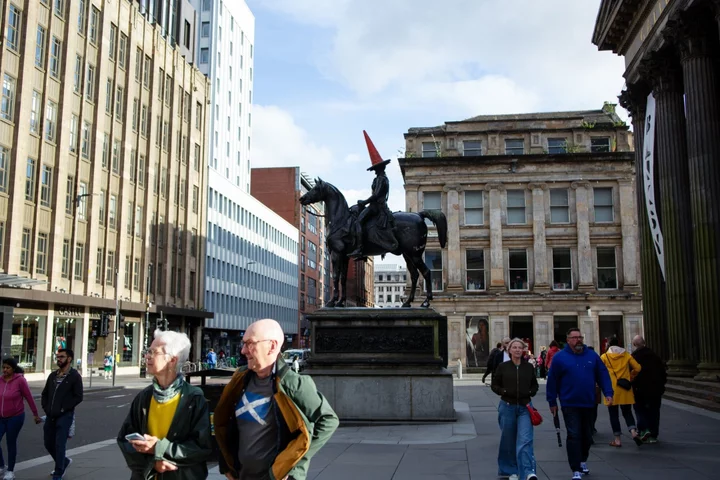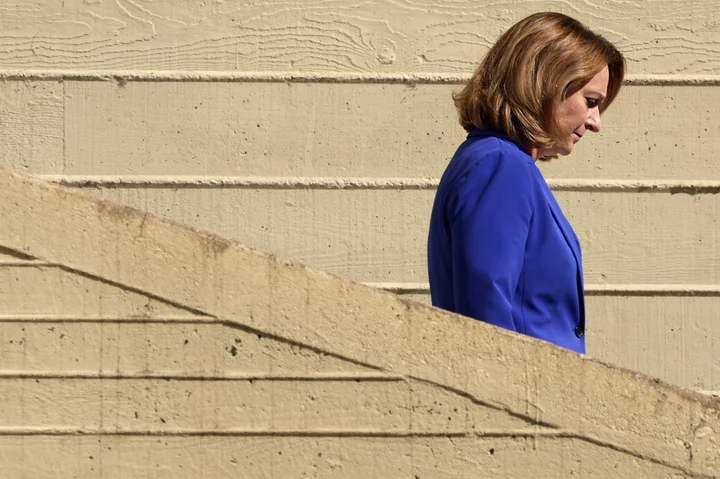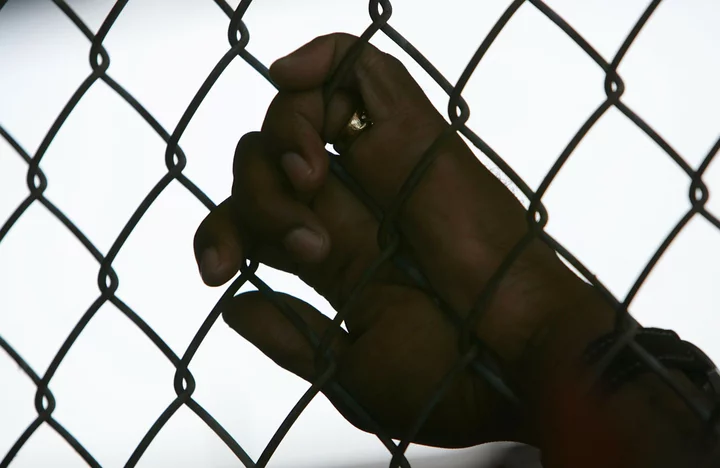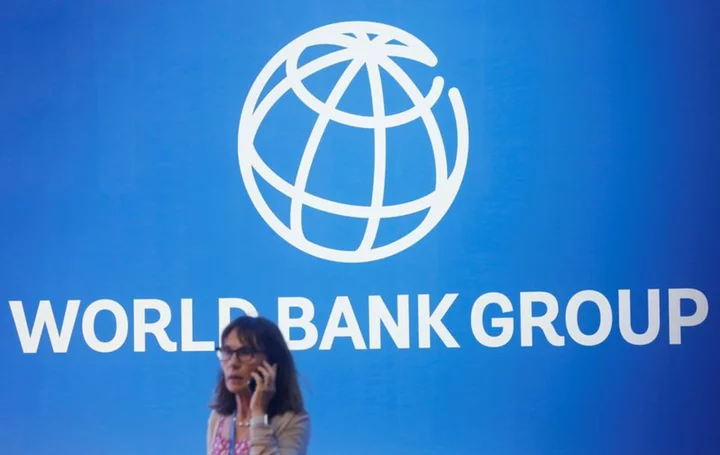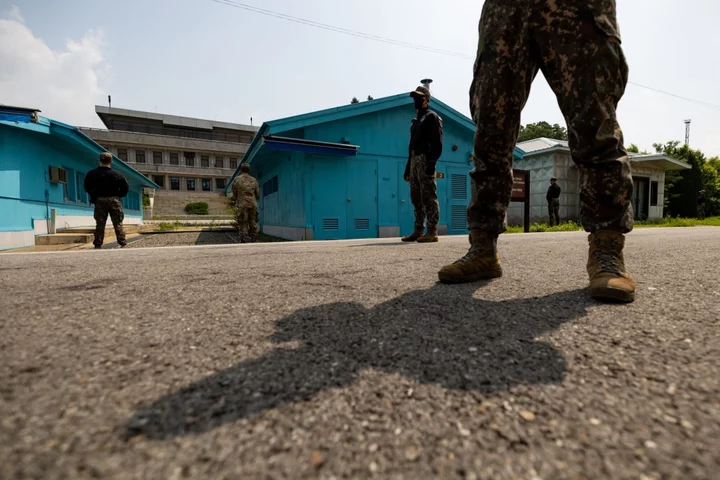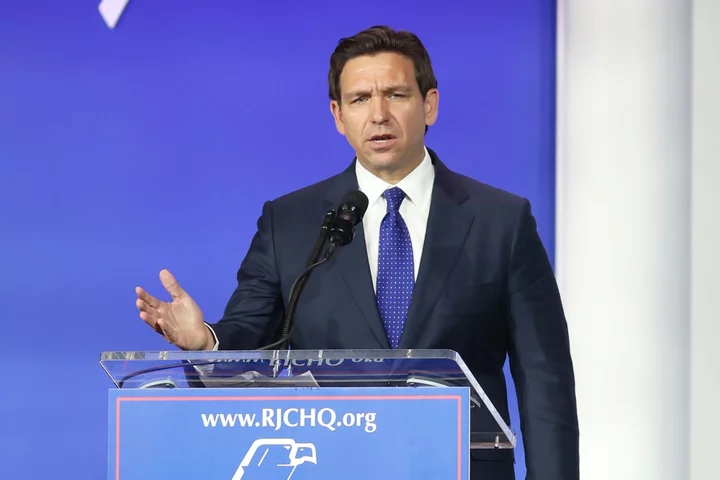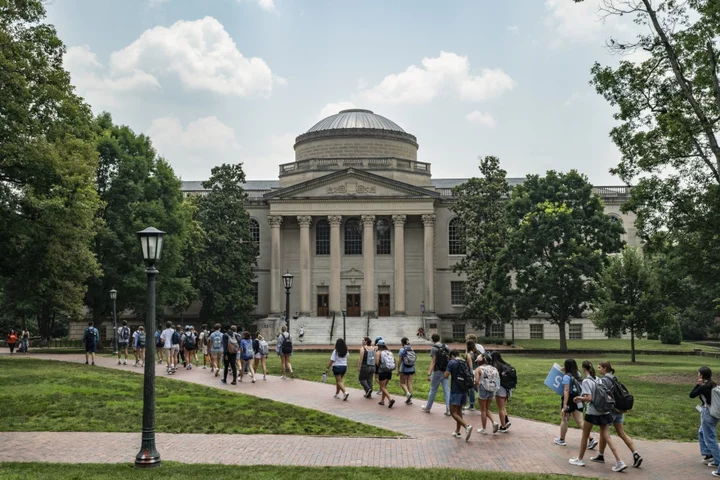A blue-and-white “Yes” sticker supporting Scottish independence sits in the corner of a window of a Victoria-era sandstone housing block in the Dennistoun area of Glasgow. Up the road in the same neighborhood of Scotland’s largest city is another decorated window, this time adorning a British union flag and a blunt “No” underneath.
It’s been almost a decade since Scotland voted to stay in the UK in a referendum, yet the question of whether the Kingdom should remain United still dominates the country’s politics and has been turbocharged since Scots voted strongly against leaving the European Union. How those two layers of division play out at the ballot box now look set to give Scotland outsized influence on the next UK general election.
Both the Dennistoun homes are in the crosshairs of a resurgent Labour Party, which under leader Keir Starmer is trying to claw back voters lost to the pro-independence Scottish National Party to ease its path back to power in Westminster. Making inroads in Glasgow, once a loyal heartland, will be key, and an early preview of the political showdown will come in a special election due in coming weeks.
In theory, it’s an open goal given the events of recent months. The SNP, the dominant electoral force in Scotland for more than a decade, is in disarray. A police investigation into its finances led to the arrest of former leader Nicola Sturgeon, her husband and the party’s treasurer. All were released without charge and deny wrongdoing, and the probe is ongoing.
Meanwhile, there’s discontent over the SNP’s running of Scotland’s semi-autonomous administration. Millions of pounds were wasted on botched ferry contracts, a controversial recycling program has been delayed, the devolved government’s handling of the pandemic has its detractors, and the SNP is challenging the UK government’s veto of its gender recognition reforms. Plans to force Prime Minister Rishi Sunak to allow another referendum on independence are going nowhere.
Anas Sarwar, leader of the party’s Scottish arm, sees an opening. “Keir has always believed that there’s no chance Labour can win the next election unless we make significant gains in Scotland,” he said in an interview. “We’ve had a very painful 16 years in Scotland and this is the first opportunity we’ve had in that time where it feels like we can change the political weather.”
Labour’s decline in Scotland dates back to 2007 when it won fewer seats than the SNP in elections to the Scottish Parliament. But its recent nadir came in 2015, when it lost 40 of the 41 Scottish districts it held in the UK Parliament. At the last UK general election, in 2019, the SNP won 48 of Scotland’s 59 seats, including all of Glasgow’s. Labour again got one, an area of Edinburgh.
Scotland has always been central to Labour’s broader fortunes. Wrangling over the prospect of a Scottish legislature helped trigger a general election in 1979, when Margaret Thatcher won power for the Conservatives. It was only after Tony Blair ousted the Tories after 18 years that the argument over devolution of power to Scotland was sidelined with the creation of the Scottish parliament in Edinburgh.
The party expects to pick up about 15 or 16 Scotland’s Westminster seats next time, according to a Labour official who spoke on condition of anonymity. Some polls show support moving above 30% for the first time in years, while the latest survey by Redfield & Wilton Strategies in August showed the gap between the SNP and Labour at just three points.
Eoin Sheehan, a research analyst at Redfield & Wilton, said Labour’s calculations look “conservative,” but that even 16 seats would mean the challenge it faces in England and Wales would be “drastically lowered.” It needs to pick up just over 120 seats across the UK to win a majority in Westminster.
“Labour does have a chance,” Conor Gildea, 30, a religious education and philosophy teacher, said in central Glasgow. Schools have been a hotbed of support for the SNP but the mood is changing in his staff room, he said. “Particularly after the pandemic, there is more and more chat about these historic allegiances to Labour that many people have in Scotland, kind of coming back a bit.”
But Labour still faces a major challenge in reconciling its electoral pitch north and south of the border. Despite the SNP’s troubles in Scotland, independence still remains the main political prism through which everything else is viewed, regardless of issues of the day like rampant inflation or the cost of mortgages, according to pollsters.
“Even when they make mistakes, they have this unifying factor of independence,” Gildea said.
Labour can’t promise independence and its Brexit politics are complicated by England, where the party is focused on winning back traditional supporters who switched to the Conservatives after the UK as a whole voted to leave the EU. Labour’s promise to “make Brexit work” does not get a ringing endorsement among pro-EU Scots.
Nina Adams, a university student working as a waitress at a café in Shawlands, a district in the SNP-held Glasgow South constituency, said Labour is no longer the party for Scotland. She will switch from the SNP at the next general election — but to the pro-independence Scottish Greens.
“British Labour haven’t looked too far into Scotland,” the 22-year-old said as she sorted through orders for coffee and bagels. “I don’t think they represent who they’re pretending to represent.”
Labour leader Starmer, 60, has visited Scotland over half a dozen times this year, including on June 19 when he promised to headquarter a new public energy company in the country, creating 50,000 jobs.
A Londoner, Starmer has a less clear draw in Scotland than past totemic figures in the party. Former leader Gordon Brown was born just to the south of Glasgow, while Blair — who secured an historic swing from the Tories to Labour in 1997 that Starmer needs to surpass — was born in Edinburgh, though he is most closely associated politically with his parliamentary district in northern England.
Labour strategists say Scottish voters fall into three equal camps: one third who are ardently pro-independence, one strongly unionist and one that votes on issues other than Scotland’s autonomy. They see this group as most open to voting for Labour. A key target is also disillusioned young voters, though the strategists said they’re making the least headway with that demographic.
Polls show Labour slowly building support, yet they also show that backing for Scottish independence has hardly budged, with the country roughly split down the middle. Redfield & Wilton found support for independence at 45%, versus 48% against in their August data.
Labour is not planning to adapt its Brexit messaging for Scotland, the person familiar with Starmer’s thinking said. The emphasis will be on moving on from the referendum and proving Labour will be better at dealing with the EU than the Conservatives, the person said.
That gels with analysis by John Curtice, professor of politics at Strathclyde University in Glasgow, who predicts the party’s pitch will be that voting for Labour is the only way to get rid of the governing Tories. “Whether or not the Conservatives can run another government or not, whether or not Scotland elects SNP MPs or Labour MPs is irrelevant,” he said. “What is potentially relevant to Scotland is whether or not Labour get an overall majority.”
Read More: Scotland’s Push to Secede From UK Won’t Go Away
On the ground in Glasgow, though, there appears to be more work for Labour to do. Many people interviewed by Bloomberg on days in June and August shared a similar sentiment: frustration by long having been ruled by a Conservative UK government they didn’t elect and suffering the consequences of a Brexit they didn’t want.
Some said their faith in the SNP had been dented, but not necessarily enough to switch allegiances.
“I honestly don’t think Labour have got a chance unless they start getting what Scottish identity is — we want the Tories out but we want a better Scotland,” said Paul Campbell, a 22-year-old studying to be a teacher. He said Labour under Starmer is too centrist, a criticism he also leveled at the SNP. “More people will likely vote Greens, and it will keep going this way until independence happens — if it happens, and hopefully it does.”
When it comes to the electoral arithmetic, it’s hard to overestimate the importance of Glasgow, once an industrial dynamo of the British Empire. With a metropolitan population of about 1.7 million, it accounts for 30% of the people living in Scotland and ranks among the biggest cities in the UK. In 2014, when Scotland voted 55% to 45% to stay part of the UK in a referendum, Glasgow embraced independence. The SNP then captured the city in the UK election a year later, winning all Glasgow districts in the UK Parliament.
“It’s clear the SNP is in trouble, but we shouldn’t underestimate them,” said Emily Gray, managing director at Ipsos Scotland. “The big question is whether they can recover from this or continue to slide in the polls.”
For its part, the SNP sees Labour’s biggest weakness as riding too close to the Conservatives on key issues that matter to voters in Scotland, primarily over Brexit. The party is trying to shift the focus back to the cost of living and the economy and away from the scandal over its finances.
On the day that Starmer was setting out his energy strategy at an event in Edinburgh, SNP leader Humza Yousaf, who replaced Sturgeon at the end of March, was trying to reinvigorate the campaign for an independent Scotland.
Still, the SNP continues to grapple with its own infighting — at least half a dozen of its MPs have already announced they’re standing down at the next election, including the party’s deputy Westminster leader Mhairi Black. Angus MacNeil, who was expelled following a row with the chief whip, has criticized the party’s independence strategy and described the SNP-led Scottish government as "utterly clueless.”
“The sentiment around the SNP is a lot different to what it was,” Chelsea Wood, 27, said as she sat outside The Gilchrist Postgraduate Club café at the University of Glasgow this month. “There is a lot of division in the party. I was a supporter of the SNP and voted for independence, but I do think that Labour might be able to gain a few seats back.”
David Linden, the SNP member of Parliament for Glasgow East, formerly one of Labour’s safest strongholds, said voters still see the party “focused on the issues that matter,” though he conceded that “the situation in terms of internal SNP politics has been less than helpful.”
The by-election due this fall next door to Linden’s district will give an indication of how that’s playing out in the minds of the electorate.
Voters triggered the election in Rutherglen and Hamilton West after Margaret Ferrier, the former SNP MP who sat as an independent in Westminster, was suspended from parliament over her breach of coronavirus rules in 2020. She won the constituency with a 10% majority over Labour in 2019.
It’s a seat Labour needs to win to show poll momentum is translating into votes. For candidate Michael Shanks, that means knocking on thousands of doors to make his case between now and October. “We are taking absolutely nothing for granted,” he said.
--With assistance from Kitty Donaldson and Emily Ashton.
Author: Ellen Milligan, Alastair Reed and Madeleine Parker

